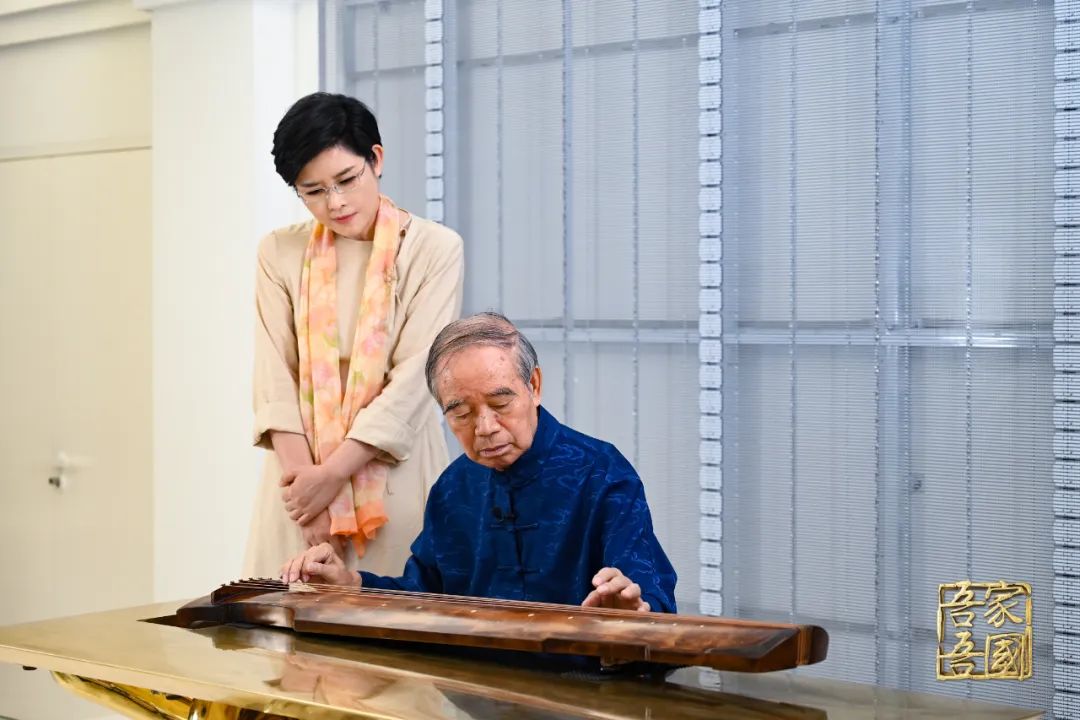Chinese musician transforms obscure instrument into global sensation
Driven by an unwavering passion for the guqin — a seven-stringed, plucked traditional Chinese musical instrument — Li Xiangting, a professor at the Central Conservatory of Music in Beijing, has dedicated nearly 70 years to mastering and promoting this ancient instrument.
Recognized as a representative inheritor of the art of guqin, which holds the distinction of being China's national intangible cultural heritage, Li has rejuvenated the instrument's appeal. He's done this not only by refining its design but also by introducing innovative playing techniques.

Li Xiangting (right) plays the guqin. (Photo/cctvnewscenter)
Li first heard guqin music on the radio when he was 15. Its melodious sound immediately piqued his curiosity, and he made his own with scrap wood and strings from the two-stringed bowed Chinese musical instrument known as the Erhu.
Driven by his profound passion for the guqin, Li reached out to Zha Fuxi, a distinguished guqin maestro of the time, in hopes of obtaining materials to study the instrument. Deeply touched by Li's enthusiasm, Zha imparted his knowledge and techniques of the guqin to Li and gifted him a guqin from the Qing Dynasty (1644-1911) as a token of appreciation.
In 1958, Li became the only guqin major in the Traditional Chinese Instruments Department at the Central Conservatory of Music, the first department of its kind since the inception of the People's Republic of China.
Given that the guqin was relatively unknown during his university years, Li often felt like an anomaly on campus.
"I was often ignored. Everyone considered the guqin obsolete, but I thought it deserved an important position in Chinese culture. I was determined to make it accepted, appreciated, and admired by everyone," Li recalled. After spending four years studying the instrument, he chose to stay at the university to teach the guqin.
In order to better popularize the guqin and introduce it to a global audience, Li collaborated with his mentor, Wu Jinglue. Together, they innovated while honoring the instrument's rich traditions, refining both the instrument and its performance techniques.
"We need to do a good job carrying forward traditional techniques and musical compositions while creating new ones," Li said.
To address the guqin's challenges with volume and noise, Li improved its strings. He also annotated classical scores, composed new pieces, and created novel techniques inspired by other musical instruments.
In 1992, at his solo recital in Paris, Li played "Three Gorges Boat Song," a piece he had composed. This marked the composition's debut performance overseas.
"After receiving thunderous applause from an audience of more than 1,000 for my performance, I thought to myself, 'I hadn't realized this piece could be so powerful,'" Li recalled.
After his successful recital in Paris, Li participated in seminars about the guqin and appeared on various TV programs discussing the instrument. He has also produced teaching videos, published books, and released albums, significantly boosting the instrument's popularity.
Owing to the efforts of guqin enthusiasts and musicians like Li, the United Nations Educational, Scientific and Cultural Organization (UNESCO) recognized the art of the guqin as a Masterpiece of the Oral and Intangible Heritage of Humanity in 2003.
Since the 1990s, Li has performed in over 50 concerts across more than 10 countries, aiming to garner more interest in the guqin and inspire more individuals to learn the instrument.
Li takes immense pride in knowing that his 500-plus students are now introducing the guqin to audiences worldwide, serving as ambassadors of Chinese culture. Moreover, his daughter, Li Pengpeng, has embraced his legacy, committing herself to a lifelong career in promoting traditional Chinese culture.
Photos
Copyright © 2023 People's Daily Online. All Rights Reserved.









